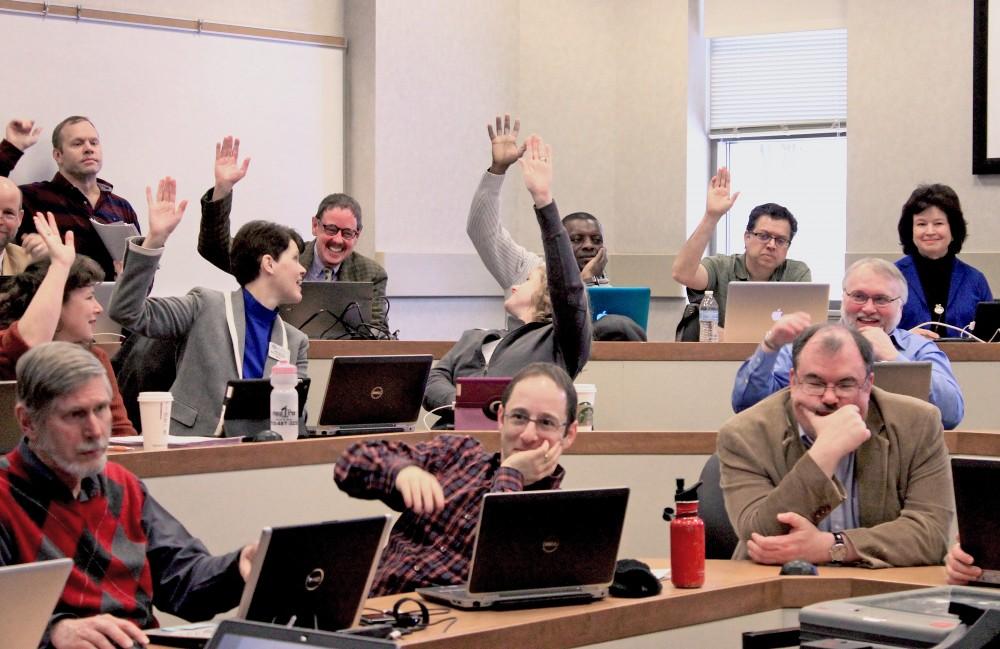UAS approves new program, standardizes student evaluations

GVl / Laine Girard Room 107D at Devos becomes a packed house as UAS members socialize and discuss policy, curriculum, and student evaluations of teaching.
Feb 3, 2014
Several senators and guests were forced to settle for a spot on the floor at the first meeting this semester of the University Academic Senate. On Friday, about 70 faculty, staff and students settled into Room 107D in the DeVos Center all vying for a spot to settle in for the afternoon of debate.
The UAS unanimously approved a new Master’s of Philanthropy and Non-Profit Leadership program, but it was one of the few things agreed upon.
“It’s a spinoff from the work we already do in the Master’s of Public Administration,” said a spokesman for George Grant, Jr., the dean of the College of Community and Public Service. “We have a lot of students who are interested in working in the non-profit sector learning management skills, and this degree is going to better suit those students that would like to have a degree that has their interest in the title.”
When the UAS moved on to discuss changes to the maternity leave policy, agreement quickly came to a halt.
The Faculty Personnel Policy Committee has been working on rewording the policy to include all faculty and staff at Grand Valley State University, not just those with teaching responsibilities.
The committee has also been working to clear up confusion regarding temporary medical leave and paid leave. Currently, the length of maternity leaves are being defined and negotiated differently in each college.
“We can’t specify every possible contingency here,” said management professor Marie McKendall, also the chair of FFPC. “It’s like a 100 different groups on campus want to shape this thing in particular ways and it’s not possible to satisfy every concern.”
Depending on the date of birth, faculty and staff can take off up to a semester of paid leave. Part of the problem is defining what a late fall birth is versus a mid-term birth as several senators asked what is “late?”
For the past two years there has been a concerted effort to fix the current language in the policy. However, the discussion did not start then.
“This issue has been alive and worked on at this campus for a decade now,” said writing professor Ellen Schendel, who worked on the original task-force that examined the policy. “There have been task-forces, there have been groups, there have been this and that. It’s important to nip in the bud the problems that exist in the policy right now.”
Another complaint from senators is that the policy does not address adoption or paternity leave.
“We were trying to be very pragmatic in how this was approached,” Schendel said. “We were afraid if we did nothing it’d stay a problem and if we reached for the stars we wouldn’t get the support we needed.”
To the dismay of some, the UAS could not agree on language and voted to send the policy back to the FFPC for further review.
“It’s taken us two years to address the very minor issue of maternity leave,” Schendel said. “If you were on ECS several years ago and heard the stories that women told about negotiating a maternity leave, you would act on this quickly.”
The debate continued into the topic of standardizing student evaluations, which has been under review at the Executive Committee of the Senate. The ECS voted last week to recommend the proposal to the UAS.
The UAS voted in favor, 25-16, for a standardized measure of evaluation. The discussion about which tool to be used will now continue in the ECS.
“It is disappointing when we don’t get any written comments,” said Kin Ma assistant professor of geography and planning. “Hopefully this will help faculty get the consistent feedback they need.”






















